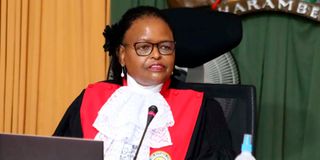Supreme Court rules that sitting president cannot be sued

Chief Justice Martha Koome led six other judges of the Supreme Court in declaring that the President enjoys immunity against prosecution over his actions or omissions during the discharge of his official functions.
In a unanimous decision, the Supreme Court Thursday ruled that a sitting President cannot be sued for his actions or omissions while in office.
Chief Justice Martha Koome led six other judges of the apex court in declaring that the President enjoys immunity against prosecution over his actions or omissions during the discharge of his official functions.
While delivering a judgment on the Constitution Amendment Bill, 2020, appeal, Justice Koome, Vice President of the Supreme Court Philomena Mwilu and justices Mohammed Ibrahim, Smokin Wanjala, Njoki Ndung’u, Isaac Lenaola and William Ouko said a sitting president enjoys immunity against prosecution.
The judges said Article 143 of the Constitution protects a sitting president from civil and criminal litigations.
Set aside orders
The judges set aside orders by the Court of Appeal and the High Court, which ruled that a President is amenable to prosecution and can be sued over his decisions that contravene the Constitution.
The judges of the two courts gave the orders while deciding eight petitions filed to challenge the Building Bridges Initiative (BBI) move to amend the Constitution, saying it was irregularly launched by President Uhuru Kenyatta and his ‘handshake’ partner Raila Odinga on March 9, 2018.
The seven-judge bench of the apex court faulted the judges of the Appellate court who heard the first appeal for failing to give a proper interpretation of the relevant laws and articles of the Constitution concerning the presidency and immunities spelt therein.
“We have all unanimously agreed with the Attorney General that no civil suit shall be instituted against a sitting President over his actions or omissions during his tenure in office,” Justice Koome said.
All the other six judges agreed with her in their separate opinions and judgements.
No civil proceedings
“Civil proceedings shall not be instituted in any court against the President or the persons performing the functions of the office in respect of anything done or not done in the exercise of their powers under the Constitution,” Justice Koome ruled.
In the event one is compelled to take any civil litigation against a sitting president, then he or she should sue through the Office of the Attorney General, who is the principal adviser to the government, said the judges.
The judge criticised the High Court judges for framing issues that the eight petitioners had not pleaded for, then going ahead to grant reliefs not sought.
The High Court had ruled that a sitting president can be sued for actions which are an affront to the Constitution.
No court action
The Supreme Court ruled that no court action should be taken against the President for spearheading the BBI in every aspect, from inception to receiving its report at the Bomas of Kenya in blatant breach of the Constitution.
Justice Koome said the Constitution grants enough legal and constitutional safeguards against the President.
She set aside orders allowing litigation against the President as prayed by Solicitor General Kennedy Ogetto and lawyers Waweru Gatonye and Mohammed Nyaoga.





